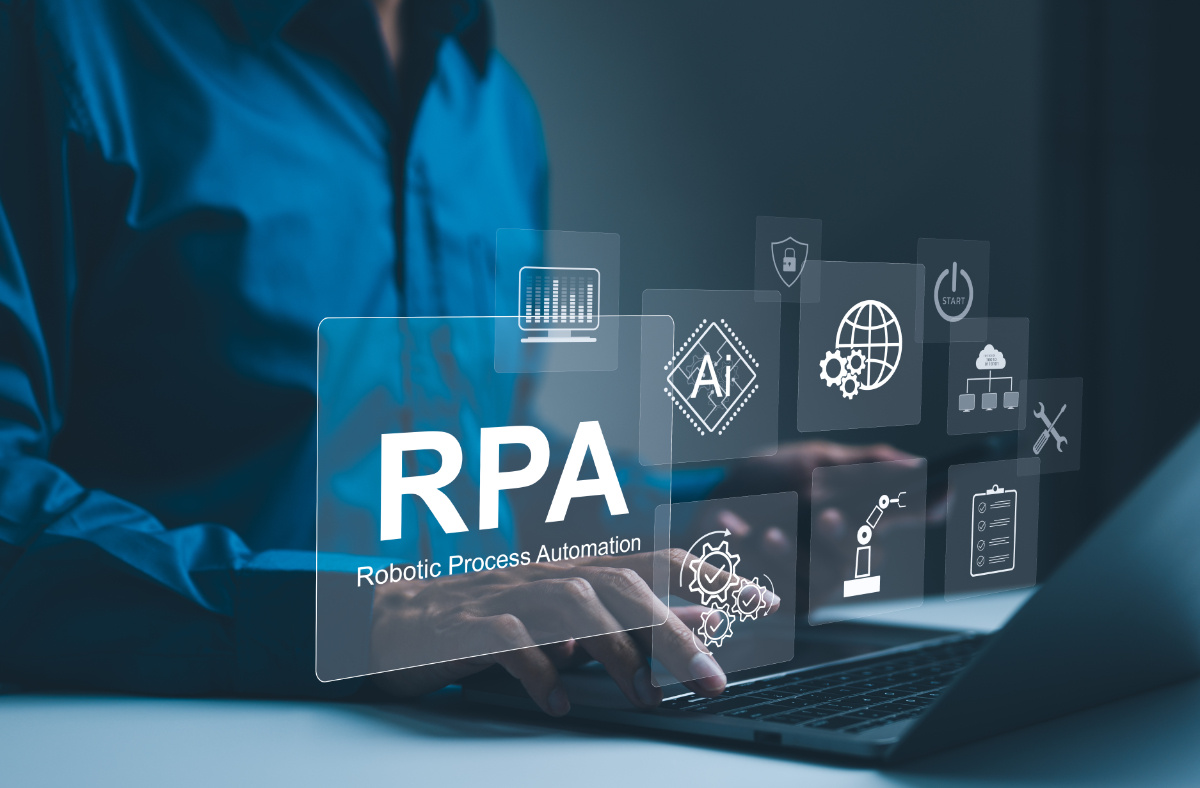How RPA Can Improve Compliance and Reduce Risk in Real Estate

The real estate industry is complex, and firms face numerous practical, legal, and regulatory challenges. The sector has also historically been slow to adopt new technologies. However, this is changing as more and more firms undergo digital transformations and embrace the capabilities of the many technologies that are now available to them. From Robotic Process Automation (RPA) to artificial intelligence (AI) and machine learning, there are now numerous ways technology can help your real estate business grow.
Companies are increasingly turning to automated solutions such as RPA to manage these challenges and scale their businesses efficiently, effectively, and sustainably. In this article, we will show you not only how an RPA solution can help you automate repetitive tasks but also how these automated workflows can reduce risk and enhance regulatory compliance in the real estate industry.
What Is Robotic Process Automation?
Robotic Process Automation is a technology that uses software robots to automate workflows and specific tasks. It is ideal for automating process-driven and repetitive tasks such as data collection, data extraction, data entry, bank reconciliations, inventory management, and document processing.
RPA bots follow rule-based scripts to mimic human processes, allowing them to perform the same task that an employee would but at much greater speeds.
This type of business process automation technology is utilized across numerous industries. Sectors such as health care, finance, manufacturing, retail, and many more utilize RPA technology to perform an array of repetitive and high-volume tasks.
RPA vs. Artificial Intelligence (AI)
While Robotic Process Automation and artificial intelligence (AI) are often mentioned together and assumed to be the same, these tools are distinct and work differently.
RPA bots are ideal for automating tasks that follow a clear set of rules. On the other hand, AI uses machine learning algorithms to perform tasks that require intelligence and decision-making, such as analyzing data and making predictions.
Thanks to advances in RPA technology, it is now possible to insert AI tools such as machine learning capabilities, natural language processing (NLP), character and image recognition, and more into your RPA solution. Combining the technologies can also be effective. For example, while your RPA bots handle data entry, AI can analyze and use the data to make informed decisions.
What Are the Benefits of RPA in the Real Estate Industry?
RPA can reduce costs, increase accuracy by eliminating human error, boost operational efficiency, and improve your business scale by delivering faster results. It is a key component of workflow automation, enhancing business processes and freeing employees from repetitive manual processes, allowing them to do tasks that require the human touch.
RPA is also a flexible solution that will work alongside existing systems in your technology stack, from AI technologies to customer relationship management (CMS) software and comprehensive real estate software systems such as Yardi and MRI.
It is particularly beneficial in highly regulated industries, including real estate. These sectors require a particularly high level of accuracy and precision, and Robotic Process Automation can eliminate errors in critical data and generate detailed reports and audit trails to ensure compliance with all relevant regulations.
RPA can take some getting used to. However, it is easy to deploy and manage once you understand it and its use cases.
Compliance Challenges in the Real Estate Industry
As a highly regulated industry, the real estate space has various compliance requirements to which businesses must adhere. For example, real estate businesses must comply with anti-money-laundering laws, ensure data protection and privacy, enforce legal contracts, maintain audit trails, and follow zoning restrictions.
Human error and poor documentation can cause real estate firms to fail to meet these requirements. This can lead to regulatory penalties, reputational damage, loss of client trust, and, ultimately, an impact on the business’s bottom line.
How RPA Improves Compliance in Real Estate
If you understand how to use it correctly, Robotic Process Automation can help your business remain compliant in several important ways.
You can reduce or eliminate human error by automating data entry and the production, updating, and filing of documentation. This immediately significantly lowers your risk of inadvertently becoming noncompliant due to a mistake.
RPA also allows you to ensure timely and accurate reporting and audit readiness, improve data quality, and consolidate data into accessible and transparent formats.
In addition, Robotic Process Automation can enhance data security and enable you to better protect sensitive data by implementing and managing access controls through automated RPA workflows.
Reducing Risk Through Automating Repetitive Tasks With RPA Implementation
Robotic Process Automation can assist you in identifying and mitigating operational risks, such as contract errors and missed deadlines, and address them promptly. For example, it can identify discrepancies in data ahead of an audit, allow you to track and verify actions taken, and detect threats before they become significant problems.
In conjunction with process mining tools, intelligent RPA can also help you identify inefficiencies and weaknesses to enhance your business processes.
With automated risk assessments, data analysis, and real-time monitoring, your RPA technology can increase your efficiency, improve accuracy, and save you a lot of money in the long run.
Steps to Implement Business Process Automation Technology in Real Estate Operations
Automating your business processes with Robotic Process Automation can require significant time and money. Therefore, it is essential to approach the process with thought, care, and intentionality.
Begin by assessing your current business processes and identifying automation opportunities. You can automate almost any repetitive task with RPA, but it is not always the best tool. It is best to start small and then scale up. Focus on quick wins and efficiency gains initially by automating repetitive and time-consuming tasks, reducing the need for human intervention.
You will also need to choose the right RPA software tools and partner to help you implement RPA. Will you involve legacy systems that you currently use? If so, you must ensure your RPA tool works seamlessly with these systems and invest in complementary technologies if necessary. REdirect has helped hundreds of clients make RPA tools work for them, simplifying the adoption process and eliminating the challenges associated with it.
Change management and employee training will be critical as you navigate the implementation and launch of your new software technologies and automation efforts. Work closely with management, team leaders, HR, and stakeholders to gain employee buy-in and support them through the digital transformation learning curve.
Finally, you will need to continuously monitor and evaluate the performance of your RPA platform and take steps to improve it.
How REdirect Can Help You Put Software Robots to Work and Make the Most of RPA Capabilities
RPA offers significant potential for real estate businesses to automate tasks, ensure compliance, and reduce risk. With rapid growth in RPA solutions, we predict that implementing RPA and AI to create automated workflows will soon become standard across our sector and beyond.
REdirect specializes in helping real estate firms leverage advanced technologies like RPA to automate processes, boost efficiency, and drive long-term cost savings. Whether you’re just starting your digital transformation, need guidance on choosing the right RPA platform, or want to optimize your current processes to maximize your technology investment, we’re here to support you every step of the way.
We collaborate with clients to design tailored digital systems and custom software stacks that deliver results and drive cost savings. With comprehensive support throughout every stage, we aim to simplify Robotic Process Automation and provide a personalized experience that prioritizes your needs.
To learn more or to get started, don’t hesitate to get in touch with us.
